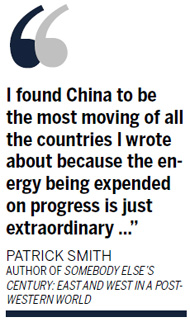AASspecial
Is China forging a modern Eastern self?
Updated: 2011-03-31 10:39
By Kelly Chung Dawson (China Daily)
|
|
NEW YORK - For more than a century, the world has defined modernity as quintessentially Western.
But in Somebody Else's Century: East and West in a Post-Western World , author Patrick Smith argues that as Asian countries draw closer to modernizing, the true challenge is to do it in a manner that does not reference the West.
He believes that power and identity in the coming century will depend on how China, Japan and India choose their paths to modernity.
"What distinguishes Asia in our time is the completion or near completion of the very project - an essentially material project - that has defined (Asia) the whole of the modern era," according to a passage in the book. "Now a project of another kind has begun. It is the source of the true Asian challenge, and we have so far failed to register it."
In three essays about China, Japan and India, Smith examines Asia's history with the West, its relationship with its own history, and how each nation is grappling with the task of defining itself in a "post-Western" world. In all three countries, Smith describes the "bittersweet smile", the surprise of emptiness in what he labeled "consumerist nihilism".
"Asia took the 19th century notion of progress entirely at face value," Smith said in an interview with China Daily. "The tragedy was that it failed to see its shortcomings, the psychological emptiness and the absence of meaning at its core. In my view, the appearance of the bittersweet smile is more or less inevitable in any country that thinks materialist strategies alone are going to solve their problems. No sooner did our 19th century conception of progress take root that many in the West began to realize the limitations of it."
When Japan and China were first confronted in the 19th century with the roaring industry of the West, both suddenly became aware of a feeling of "lateness" that defied all traditional Asian notions of time, he said. The West was "up there" and Asia was "back here." What followed was an intense push to catch up, fueled by feelings of inferiority that led to a phenomenon called "doubling", a split between a traditional and modern self. Asia accepted the modern Western self without question, placing the traditional self in a museum of identity that was revered but also viewed as evidence of Asia's shortcomings, said Smith.
Because Japan completed its project of modernization earlier, it is now in the process of eliminating this double self. Contrary to Western observers who wondered at Japan's seeming failure to grab power after its extraordinary rise in the 1980s, Smith believes that Japan is now redefining power, choosing to employ "power without projection", a national strategy he believes the United States will ultimately be forced to consider.
In his essay on India, the nation has until now avoided the pitfalls of doubling, due to a long tradition of alternative, eccentric thinking. It has not made a tradition of tearing down its past, replacing old with new, as China and Japan often have done. Instead, new and old exist side by side with seemingly no contradiction or discomfort. As a result, the Western notion of chronological time has failed to take root, allowing an Asian, heterogeneous conception of time to remain in place. India does not face the same identity issues that other Asian nations have been confronted with, Smith said. It is interesting that the very individualistic nature of India's national identity may be its salvation, because as Smith writes elsewhere, the West may yet be forced to relinquish its fixation on the individual.
India now also faces Smith's "bittersweet smile", but the author seems to argue that in the path it has taken, India may be well equipped to forge a non-Western path forward. Micro-finance is one example of an Indian solution to an Indian problem, Smith writes.
Of the three nations, China remains most enthralled with progress and modernization, Smith said.
"I found China to be the most moving of all the countries I wrote about because the energy being expended on progress is just extraordinary, and cannot be explained on the basis of economic need alone," he said. "The sensation of weakness and the desire to overcome that are very powerful forces among the Chinese. All eyes are tilted upward."
While China might take lessons from the various ways in which Japan and India have handled modernization, the solution for China will likely arise on Chinese soil, Smith said.
China Daily
Specials

London's Olympic Stadium
Construction on the flagship stadium for the 2012 London Olympics was completed Tuesday.

The queen of panda cubs
Spanish Queen Sofia laughs as she plays with a panda.

Donkey-powered Land Rover
Two donkeys pull a broken-down Land Rover in Shenyang, Liaoning province.
